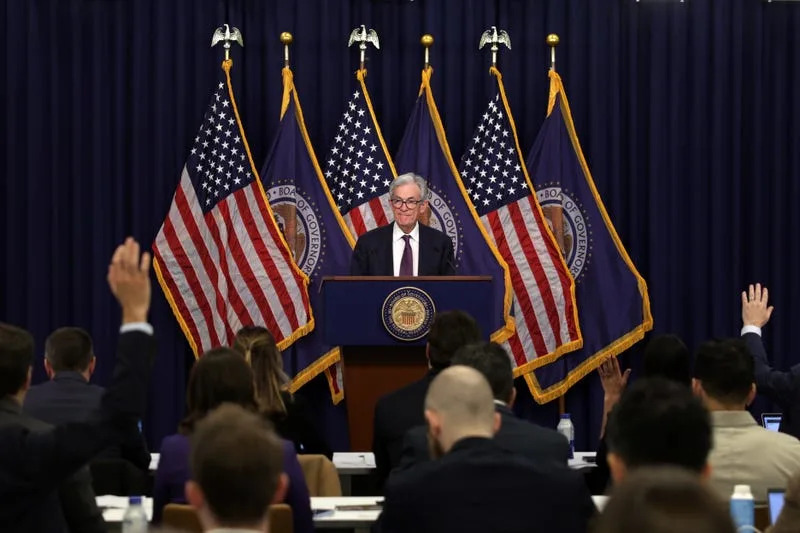News
Why Everything Everywhere All at Once isn’t just a movie — it’s the market
John Petrides, Portfolio Manager at Tocqueville Asset Management, spoke with Quartz for the latest installment of our “Smart Investing” video series.
Watch the interview above and check out the transcript below. The transcript of this conversation has been lightly edited for length and clarity.
ANDY MILLS (AM): The Federal Reserve just cut by a quarter point and indicated fewer reductions ahead. How do you expect their announcement to impact investor sentiment?
JOHN PETRIDES (JP): I feel fortunate that we’re having this discussion, but as we speak, Powell is having his conversation. So I think it’s more in his words, driving the market forward and how the market will react to his words. The Fed did something that my team thought they shouldn’t.
In September, they cut interest rates by half of 1%, 50 basis points, which is something they hadn’t done in a very long time. Their cadence to cut has always been a quarter of one point or 25 basis points. Clearly, that was too aggressive, right? Because now they fulfilled their 100 basis point, one full percentage point cut from September to now, which is what they’ve done.
They’ve gone from four and a half, five and a half to four and a half. But now the projections for 2025 have been dialed from the Fed funds rate to be at 3.25% to now being 3.75%. And I think that’s ultimately where we’ll shake out.
AM: What does that mean for investors?
JP: Yeah, I think in the bond market, you’re gonna see more volatility. Investors have been pricing in the Fed to be significantly more aggressive. I think that investors should focus on the good news within, which is that the underlying economy is not in recession anytime soon. We’ve been arguing for years about the hard landing, no landing, soft landing.
Clearly we’re not in a hard landing situation. The underlying economy is strong, and the job market is doing okay and that is the main reason why the Fed is ratcheting back its interest rate cut forecast is that the underlying economy has been significantly stronger than what the Fed had anticipated.
AM: Sounds like good news.
JP: Yeah, that’s right. And if you’re an investor in equities, you wanna look for companies that have stable earnings, good cash flow, and an economy that supports that is helpful actually for the underlying stock market.

AM: You described the market as “everything everywhere all at once.” It’s a good movie. What’s the single biggest risk to investors right now?
JP: I think it’s chasing returns. What I mean by that is everything everywhere seems expensive for the most part. You have US stocks on all the three major indices of the S&P 500, the Nasdaq, and the Dow; if they’re not at record highs, they’re near record highs.
You have credit spreads on the bond market, meaning you take a corporate bond where the yield is compared to the US Treasury, and it’s really, really tight, like super tight, and you want it to be wider. You have gold near all-time highs. You have Bitcoin at or near all-time highs. So where is it that you find value?
And in our opinion my team, specifically overseas, international non-US based companies that sell globally, that’s attractive. Smaller cap stocks are attractive. Healthcare stocks, which have been one of the worst-performing sectors, are attractive. So, the point behind all that is that I think blindly buying an index fund or the market right now is not a wise strategy because the market is not cheap from a valuation standpoint.
AM: You mentioned healthcare as an opportunity for investors to find value and international; you also have highlighted that possibly in 2025, mergers and acquisition activity could pick up. How can investors take advantage of that?
JP: Yeah, I think you’re gonna see massive M&A, mergers, and acquisitions in 2025. First of all, with the new administration coming on, it is clearly pro-deregulation. You saw the prior administration and the FDC under Lena Khan and what they’ve done to try to attempt to break up Google ( GOOGL ). The roadblocks they put in from Microsoft ( MSFT ) to ultimately buy Activision. They were not pro-M&A.
So now, you have what seems to be a more corporate-friendly administration coming in, and you’re seeing that already, as well as announced deals in the ad agency between IPG ( IPG ) and Omnicom ( OMC ). You’re seeing, at least internationally, you’re seeing Honda ( HMC ) and Nissan ( NSANY ) announce, and we don’t own any of those companies, but you see those companies that are talking as well. So, risk appetite is gonna increase.
We think one way to play that for our clients and our income strategy. For my team specifically, we own the merger fund, MERIX. It’s a mutual fund that plays on the spread for a deal activity. And also, you could play small-cap stocks. Small-cap stocks have grossly underperformed large-cap. So small cap, you think a company that wants to buy their top line growth could just pick up the small cap stocks rather than having to do it organically. So, we think small caps wouldn’t benefit in a rising M&A environment.
AM: MERIX and then what was the other fund for that?
JP: IWO, which is another ETF that we own. That’s the Russell Small Cap Growth Index ( IWO ). So that’s a way to play the whole small-cap space.
For the latest news, Facebook , Twitter and Instagram .

